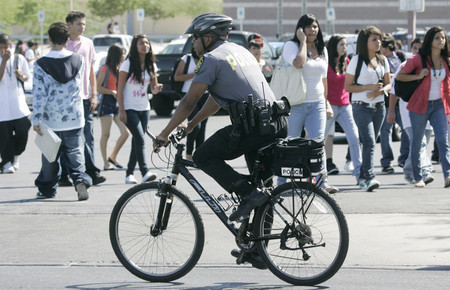Arbitration ruling expected
After a student shot and killed a teacher at Valley High School in 1982, the state Legislature authorized the Clark County School District to replace campus security guards with fully trained and accredited police officers.
Twenty years after the legislation, school district police officers are fighting to get professional recognition and better pay from their employer.
In an unusual twist to a labor dispute, the school district's lawyer, Bill Hoffman, has argued a legal distinction to deny the district has a police department. Its police officers are not entitled to a "speedy" type of binding arbitration like other police officers are, he said.
In effect, the district is making it more difficult for the school police officers to reach what a conservative critic calls the "gold mine" of binding arbitration, essentially allowing an independent arbitrator to decide the terms of a labor contract.
Binding arbitration could put the police union in a better bargaining position at a time when the district is desperate for cash.
Because of state budget cuts, the district slashed programs this year by $120 million.
Steven Miller, vice president for policy for the conservative Nevada Policy Research Institute, said binding arbitration encourages unions to make unrealistic requests because they know that a sympathetic arbitrator will usually just split the difference.
"All state and local governments would like to backtrack on this mistake (of allowing binding arbitration)," Miller said.
School police officers, whose last labor contract expired June 30, 2007, earn less money in regular pay than Metropolitan Police Department officers. They make between $39,180 and $67,200 annually while Las Vegas officers earn between $51,168 and $80,244.
The school district has about 170 police officers. To fill vacancies, the district has been offering starting pay at $45,500, but has reserved the right to revert back to offering the starting salary of $39,180, said Mike Thomas, president of the Police Officers Association of the Clark County School District.
Because of the ongoing disagreement on how to structure the salary table, the police union and school district have not been able to reach agreement on a new contract. Lack of an agreement cost the school police officers the 4 percent pay hikes -- commonly known as cost-of-living increases -- that other school employees got in 2008.
To help resolve the dispute, the Local Government Employee Management Relations Board is expected to rule Oct. 27 on whether school police meet the legal definition of police officers as salaried members of a "law enforcement agency organized by a political subdivision."
Hoffman, the school district lawyer, said "it's a very narrow legal question."
Because it's a "form over substance"-type issue, Hoffman said, "I don't diminish their importance to the school district at all."
Thomas, president of the police union, has made hay out of Hoffman's legal argument, saying it's bad for both morale and public safety.
Thomas said Hoffman was limiting their jurisdiction to the "curb" of the campus.
School officers are now second-guessing themselves on what they can and cannot do, which is perilous since officers often must make "split-second, life and death decisions," he said.
"We wear gray uniforms, but it doesn't mean we should work in a gray area," Thomas said.
In a May 13 hearing before the Employee Management Relations Board, union police officers described their professional capabilities and responsibilities, making the argument that if it walks like a duck and quacks like a duck, then it must be a duck.
As evidence, they have submitted copies of badges and identification cards which bear the inscription, "Clark County School District Police Department."
School police have the same powers of arrest as other city police officers. They're often called off campus by city police officers to assist in their investigations. School district police have a dispatch center.
As police officers, they have some professional independence from school administrators. Principals, for example, are not allowed to interfere with arrests of students or staff.
This used to be a problem, especially when police had to arrest a star athlete. Sgt. Phil Gervasi said school administrators used to tell officers things like, "He's got to pitch a baseball game tomorrow. We don't want him to be arrested."
School police are not allowed to share privileged data from the National Crime Information Center with school personnel who are civilians.
As school police officers, they must defer all "Class A Felony" cases, such as slayings and rapes, to the city or county police department with jurisdiction over their campus, but school police officers said that in many instances they are authorized to handle the cases themselves.
While the school police have argued the facts, the school district lawyers have argued the law.
Hoffman has drawn parallels to a 1995 case in which the Nevada Supreme Court ruled that Clark County park rangers were not members of a police department, but instead were salaried employees of the county.
The Supreme Court did not deny that the park rangers were police officers, but ruled that they did not meet a legal description of belonging to a "law enforcement agency organized by a political subdivision."
So the park rangers could not get the same kind of arbitration made available to police officers.
Hoffman said the school police officers can still get binding arbitration, "but there is an extra step you have to go through."
They have to appeal to a three-member panel, which then sets the bargaining terms.
As the school district lawyer, Hoffman has made less money annually than some school police officers. Because of overtime, some school police officers in 2007 were able to more than double their salaries.
In 2007, Hoffman was paid $154,524 in total compensation while school police officer Anthony Cooke earned $160,640 and officer Christopher Law earned $180,261.
Thomas said the district has since imposed restrictions on overtime and is hiring Las Vegas police officers for football games.
He said they are more expensive than school police officers.
Contact reporter James Haug at jhaug @reviewjournal.com or 702-374-7917.

















